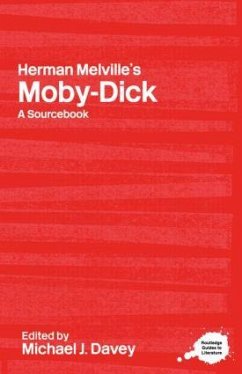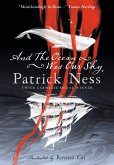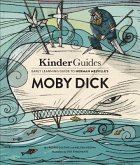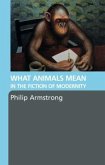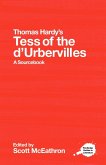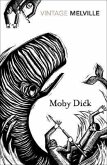Michael J. Davey (ed.)A Routledge Study Guide and Sourcebook
Herman Melville's Moby-Dick
A Routledge Study Guide and Sourcebook
Herausgegeben:Davey, Michael J.
20,99 €
inkl. MwSt.
Versandfertig in 6-10 Tagen

10 °P sammeln
Michael J. Davey (ed.)A Routledge Study Guide and Sourcebook
Herman Melville's Moby-Dick
A Routledge Study Guide and Sourcebook
Herausgegeben:Davey, Michael J.
- Broschiertes Buch
- Merkliste
- Auf die Merkliste
- Bewerten Bewerten
- Teilen
- Produkt teilen
- Produkterinnerung
- Produkterinnerung
Combining reprinted documents with clear introductions for student readers, this volume examines the contexts of and critical responses to Melville's work.
Andere Kunden interessierten sich auch für
![And the Ocean Was Our Sky And the Ocean Was Our Sky]() Patrick NessAnd the Ocean Was Our Sky17,99 €
Patrick NessAnd the Ocean Was Our Sky17,99 €![Herman Melville's Moby Dick Herman Melville's Moby Dick]() Fredrik ColtingHerman Melville's Moby Dick15,99 €
Fredrik ColtingHerman Melville's Moby Dick15,99 €![What Animals Mean in the Fiction of Modernity What Animals Mean in the Fiction of Modernity]() Philip ArmstrongWhat Animals Mean in the Fiction of Modernity42,99 €
Philip ArmstrongWhat Animals Mean in the Fiction of Modernity42,99 €![Thomas Hardy's Tess of the d'Urbervilles Thomas Hardy's Tess of the d'Urbervilles]() Scott McEathron (ed.)Thomas Hardy's Tess of the d'Urbervilles20,99 €
Scott McEathron (ed.)Thomas Hardy's Tess of the d'Urbervilles20,99 €![Moby Dick Moby Dick]() Herman MelvilleMoby Dick18,99 €
Herman MelvilleMoby Dick18,99 €![Approaches to Teaching Melville's Moby-Dick Approaches to Teaching Melville's Moby-Dick]() Approaches to Teaching Melville's Moby-Dick22,99 €
Approaches to Teaching Melville's Moby-Dick22,99 €![Charlotte Perkins Gilman's The Yellow Wall-Paper Charlotte Perkins Gilman's The Yellow Wall-Paper]() Catherine Golden (ed.)Charlotte Perkins Gilman's The Yellow Wall-Paper43,99 €
Catherine Golden (ed.)Charlotte Perkins Gilman's The Yellow Wall-Paper43,99 €-
-
-
Combining reprinted documents with clear introductions for student readers, this volume examines the contexts of and critical responses to Melville's work.
Produktdetails
- Produktdetails
- Routledge Guides to Literature
- Verlag: Routledge / Taylor & Francis
- Artikelnr. des Verlages: RU22253
- Seitenzahl: 204
- Erscheinungstermin: 18. September 2003
- Englisch
- Abmessung: 216mm x 140mm x 11mm
- Gewicht: 282g
- ISBN-13: 9780415247719
- ISBN-10: 0415247713
- Artikelnr.: 13004731
- Herstellerkennzeichnung
- Libri GmbH
- Europaallee 1
- 36244 Bad Hersfeld
- gpsr@libri.de
- Routledge Guides to Literature
- Verlag: Routledge / Taylor & Francis
- Artikelnr. des Verlages: RU22253
- Seitenzahl: 204
- Erscheinungstermin: 18. September 2003
- Englisch
- Abmessung: 216mm x 140mm x 11mm
- Gewicht: 282g
- ISBN-13: 9780415247719
- ISBN-10: 0415247713
- Artikelnr.: 13004731
- Herstellerkennzeichnung
- Libri GmbH
- Europaallee 1
- 36244 Bad Hersfeld
- gpsr@libri.de
Michael J. Davey teaches Early American Literature at Valdosta State University, Georgia, USA, where he is Assistant Professor.
Introduction I: Contexts, Contextual Overview, Melville's Career and the Writing of Moby-Dick, Melville and Antebellum America, Chronology; Contemporary Documents: From Owen Chase, The Wreck of the Whaleship Essex (1821) From Herman Melville, Hawthorne and His Mosses (1850) From Nathaniel Hawthorne, The Custom-House Sketch (1850) Transcendentalism: From Ralph Waldo Emerson, Self-Reliance (1841) From Ralph Waldo Emerson, Nature (1836) From Ralph Waldo Emerson, Nature: Chapter IV. Language (1836) Selected Letters: From Melville to Evert A. Duyckinck (March 3, 1848) From Melville to Nathaniel Hawthorne (April16, 1851) From Melville to Nathaniel Hawthorne (June 18], 1851) From Melville to Nathaniel Hawthorne (November 1851) From Melville to Sarah Huyler Morewood (September 1851) 2: Interpretations Critical History, Early Critical Reception: From review of Typee, United States Nautical Magazine (March 1846) From review of Typee, Critic [London], (March 1846) From review of Redburn, Bentley's Miscellany [London], (November 1849) From review of Redburn, New York Sunday Times and Noah's Weekly Messenger (November 18, 1849) From review of Moby-Dick, New York Evangelist (November 20, 1851) From review of Moby-Dick, Boston Post (November 20, 1851) From review of Moby-Dick, Albion [New York], (November 22, 1851) From Evert A. Duyckinck, review of Moby-Dick, Literary World [New York], (November 22, 1851) From review of Moby-Dick, Literary Gazette [London], (December 6, 1851) Modern Criticism: The Melville Revival:From E. L. Grant Watson, review of Melville's Moby-Dick (1920) From Frank Jewett Mather, Jr., Herman Melville (1919) From Raymond M. Weaver, The Centennial of Herman Melville (1919) From Carl Van Doren, Mr. Melville's Moby-Dick (1924) From H. M. Tomlinson, A Clue to Moby-Dick (1921) Moby-Dick Rising: Melville Criticism 1919-1970: From William Charvat, Melville and the Common Reader (1958) From Walter E. Bezanson, Moby-Dick: Work of Art (1953) From Merton M. Sealts, Jr., Melville and Emerson's Rainbow (1982) From Leon Howard, The Influence of Carlyle (1987) From Henry A. Murray, In Nomine Diaboli (1951) From]. A. Ward, The Function of the Cetological Chapters in Moby-Dick(1956) 92From Robert M. Greenberg, Cetology: Center of Multiplicity and Discord inMoby-Dick (1981) 95From Thomas Werge, Moby-Dick and the Calvinist Tradition (1969) 96Moby-Dick at the Millennium 98From Frank Shuffelton, Going Through the Long Vaticans: Melville's' Extracts' in Moby-Dick (1983) 98From Mark Niemeyer, Moby-Dick and the Spirit of Revolution (1994) 100From John Alvis, Mohy-Dick and Melville's Quarrel with America (1993) 103From DavidS. Reynolds, 'Its wood could only be American!': Moby-Dick and Antebellum Popular Culture (1992) 105From Sheila Post-Lauria, Originality: The Case of Moby-Dick (1996) 107From Elizabeth Schultz, The Sentimental Subtext of Moby-Dick: Melville's Response to the 'World of Woe' (1996) 109From Leland S. Person Jr., Melville's Cassock: Putting on Masculinity in Moby-Dick (1994) 113From Sterling Stuckey, The Tambourine in Glory: African Culture and Melville's Art (1998) 115From Joseph Andriano, Brother to Dragons: Race and Evolution in Moby-Dick (1996) From Paul Giles, 'Bewildering Intertanglement': Melville's Engagement with British Culture (1998) 3: Key Passages, Principal Biblical Allusions: Chapter 1: Loomings Chapter 3: The Spouter-Inn Chapter 9: The Sermon Chapter 10: A Bosom Friend Chapter 16: The Ship Chapter 23: The Lee Shore Chapter 26: Knights and Squires Chapter 27: Knights and Squires Chapter 28: Ahab Chapter 36: The Quarter-Deck Chapter 41: Moby Dick Chapter 42: The Whiteness of the Whale Chapter 44: The Chart Chapter 70: The Sphynx Chapter 95: The Cassock Chapter 96: The Try-Works Chapter 99: The Doubloon Chapter 114: The Gilder Chapter 119: The Candles Chapter 132: The Symphony Chapter 135: The Chase- Third Day, Epilogue4: Further Reading.
Introduction I: Contexts
Contextual Overview
Melville's Career and the Writing of Moby-Dick
Melville and Antebellum America
Chronology; Contemporary Documents: From Owen Chase
The Wreck of the Whaleship Essex (1821) From Herman Melville
Hawthorne and His Mosses (1850) From Nathaniel Hawthorne
The Custom-House Sketch (1850) Transcendentalism: From Ralph Waldo Emerson
Self-Reliance (1841) From Ralph Waldo Emerson
Nature (1836) From Ralph Waldo Emerson
Nature: Chapter IV. Language (1836) Selected Letters: From Melville to Evert A. Duyckinck (March 3
1848) From Melville to Nathaniel Hawthorne (April16
1851) From Melville to Nathaniel Hawthorne (June 18]
1851) From Melville to Nathaniel Hawthorne (November 1851) From Melville to Sarah Huyler Morewood (September 1851) 2: Interpretations Critical History
Early Critical Reception: From review of Typee
United States Nautical Magazine (March 1846) From review of Typee
Critic [London]
(March 1846) From review of Redburn
Bentley's Miscellany [London]
(November 1849) From review of Redburn
New York Sunday Times and Noah's Weekly Messenger (November 18
1849) From review of Moby-Dick
New York Evangelist (November 20
1851) From review of Moby-Dick
Boston Post (November 20
1851) From review of Moby-Dick
Albion [New York]
(November 22
1851) From Evert A. Duyckinck
review of Moby-Dick
Literary World [New York]
(November 22
1851) From review of Moby-Dick
Literary Gazette [London]
(December 6
1851) Modern Criticism: The Melville Revival:From E. L. Grant Watson
review of Melville's Moby-Dick (1920) From Frank Jewett Mather
Jr.
Herman Melville (1919) From Raymond M. Weaver
The Centennial of Herman Melville (1919) From Carl Van Doren
Mr. Melville's Moby-Dick (1924) From H. M. Tomlinson
A Clue to Moby-Dick (1921) Moby-Dick Rising: Melville Criticism 1919-1970: From William Charvat
Melville and the Common Reader (1958) From Walter E. Bezanson
Moby-Dick: Work of Art (1953) From Merton M. Sealts
Jr.
Melville and Emerson's Rainbow (1982) From Leon Howard
The Influence of Carlyle (1987) From Henry A. Murray
In Nomine Diaboli (1951) From]. A. Ward
The Function of the Cetological Chapters in Moby-Dick(1956) 92From Robert M. Greenberg
Cetology: Center of Multiplicity and Discord inMoby-Dick (1981) 95From Thomas Werge
Moby-Dick and the Calvinist Tradition (1969) 96Moby-Dick at the Millennium 98From Frank Shuffelton
Going Through the Long Vaticans: Melville's' Extracts' in Moby-Dick (1983) 98From Mark Niemeyer
Moby-Dick and the Spirit of Revolution (1994) 100From John Alvis
Mohy-Dick and Melville's Quarrel with America (1993) 103From DavidS. Reynolds
'Its wood could only be American!': Moby-Dick and Antebellum Popular Culture (1992) 105From Sheila Post-Lauria
Originality: The Case of Moby-Dick (1996) 107From Elizabeth Schultz
The Sentimental Subtext of Moby-Dick: Melville's Response to the 'World of Woe' (1996) 109From Leland S. Person Jr.
Melville's Cassock: Putting on Masculinity in Moby-Dick (1994) 113From Sterling Stuckey
The Tambourine in Glory: African Culture and Melville's Art (1998) 115From Joseph Andriano
Brother to Dragons: Race and Evolution in Moby-Dick (1996) From Paul Giles
'Bewildering Intertanglement': Melville's Engagement with British Culture (1998) 3: Key Passages
Principal Biblical Allusions: Chapter 1: Loomings Chapter 3: The Spouter-Inn Chapter 9: The Sermon Chapter 10: A Bosom Friend Chapter 16: The Ship Chapter 23: The Lee Shore Chapter 26: Knights and Squires Chapter 27: Knights and Squires Chapter 28: Ahab Chapter 36: The Quarter-Deck Chapter 41: Moby Dick Chapter 42: The Whiteness of the Whale Chapter 44: The Chart Chapter 70: The Sphynx Chapter 95: The Cassock Chapter 96: The Try-Works Chapter 99: The Doubloon Chapter 114: The Gilder Chapter 119: The Candles Chapter 132: The Symphony Chapter 135: The Chase- Third Day
Epilogue4: Further Reading.
Contextual Overview
Melville's Career and the Writing of Moby-Dick
Melville and Antebellum America
Chronology; Contemporary Documents: From Owen Chase
The Wreck of the Whaleship Essex (1821) From Herman Melville
Hawthorne and His Mosses (1850) From Nathaniel Hawthorne
The Custom-House Sketch (1850) Transcendentalism: From Ralph Waldo Emerson
Self-Reliance (1841) From Ralph Waldo Emerson
Nature (1836) From Ralph Waldo Emerson
Nature: Chapter IV. Language (1836) Selected Letters: From Melville to Evert A. Duyckinck (March 3
1848) From Melville to Nathaniel Hawthorne (April16
1851) From Melville to Nathaniel Hawthorne (June 18]
1851) From Melville to Nathaniel Hawthorne (November 1851) From Melville to Sarah Huyler Morewood (September 1851) 2: Interpretations Critical History
Early Critical Reception: From review of Typee
United States Nautical Magazine (March 1846) From review of Typee
Critic [London]
(March 1846) From review of Redburn
Bentley's Miscellany [London]
(November 1849) From review of Redburn
New York Sunday Times and Noah's Weekly Messenger (November 18
1849) From review of Moby-Dick
New York Evangelist (November 20
1851) From review of Moby-Dick
Boston Post (November 20
1851) From review of Moby-Dick
Albion [New York]
(November 22
1851) From Evert A. Duyckinck
review of Moby-Dick
Literary World [New York]
(November 22
1851) From review of Moby-Dick
Literary Gazette [London]
(December 6
1851) Modern Criticism: The Melville Revival:From E. L. Grant Watson
review of Melville's Moby-Dick (1920) From Frank Jewett Mather
Jr.
Herman Melville (1919) From Raymond M. Weaver
The Centennial of Herman Melville (1919) From Carl Van Doren
Mr. Melville's Moby-Dick (1924) From H. M. Tomlinson
A Clue to Moby-Dick (1921) Moby-Dick Rising: Melville Criticism 1919-1970: From William Charvat
Melville and the Common Reader (1958) From Walter E. Bezanson
Moby-Dick: Work of Art (1953) From Merton M. Sealts
Jr.
Melville and Emerson's Rainbow (1982) From Leon Howard
The Influence of Carlyle (1987) From Henry A. Murray
In Nomine Diaboli (1951) From]. A. Ward
The Function of the Cetological Chapters in Moby-Dick(1956) 92From Robert M. Greenberg
Cetology: Center of Multiplicity and Discord inMoby-Dick (1981) 95From Thomas Werge
Moby-Dick and the Calvinist Tradition (1969) 96Moby-Dick at the Millennium 98From Frank Shuffelton
Going Through the Long Vaticans: Melville's' Extracts' in Moby-Dick (1983) 98From Mark Niemeyer
Moby-Dick and the Spirit of Revolution (1994) 100From John Alvis
Mohy-Dick and Melville's Quarrel with America (1993) 103From DavidS. Reynolds
'Its wood could only be American!': Moby-Dick and Antebellum Popular Culture (1992) 105From Sheila Post-Lauria
Originality: The Case of Moby-Dick (1996) 107From Elizabeth Schultz
The Sentimental Subtext of Moby-Dick: Melville's Response to the 'World of Woe' (1996) 109From Leland S. Person Jr.
Melville's Cassock: Putting on Masculinity in Moby-Dick (1994) 113From Sterling Stuckey
The Tambourine in Glory: African Culture and Melville's Art (1998) 115From Joseph Andriano
Brother to Dragons: Race and Evolution in Moby-Dick (1996) From Paul Giles
'Bewildering Intertanglement': Melville's Engagement with British Culture (1998) 3: Key Passages
Principal Biblical Allusions: Chapter 1: Loomings Chapter 3: The Spouter-Inn Chapter 9: The Sermon Chapter 10: A Bosom Friend Chapter 16: The Ship Chapter 23: The Lee Shore Chapter 26: Knights and Squires Chapter 27: Knights and Squires Chapter 28: Ahab Chapter 36: The Quarter-Deck Chapter 41: Moby Dick Chapter 42: The Whiteness of the Whale Chapter 44: The Chart Chapter 70: The Sphynx Chapter 95: The Cassock Chapter 96: The Try-Works Chapter 99: The Doubloon Chapter 114: The Gilder Chapter 119: The Candles Chapter 132: The Symphony Chapter 135: The Chase- Third Day
Epilogue4: Further Reading.
Introduction I: Contexts, Contextual Overview, Melville's Career and the Writing of Moby-Dick, Melville and Antebellum America, Chronology; Contemporary Documents: From Owen Chase, The Wreck of the Whaleship Essex (1821) From Herman Melville, Hawthorne and His Mosses (1850) From Nathaniel Hawthorne, The Custom-House Sketch (1850) Transcendentalism: From Ralph Waldo Emerson, Self-Reliance (1841) From Ralph Waldo Emerson, Nature (1836) From Ralph Waldo Emerson, Nature: Chapter IV. Language (1836) Selected Letters: From Melville to Evert A. Duyckinck (March 3, 1848) From Melville to Nathaniel Hawthorne (April16, 1851) From Melville to Nathaniel Hawthorne (June 18], 1851) From Melville to Nathaniel Hawthorne (November 1851) From Melville to Sarah Huyler Morewood (September 1851) 2: Interpretations Critical History, Early Critical Reception: From review of Typee, United States Nautical Magazine (March 1846) From review of Typee, Critic [London], (March 1846) From review of Redburn, Bentley's Miscellany [London], (November 1849) From review of Redburn, New York Sunday Times and Noah's Weekly Messenger (November 18, 1849) From review of Moby-Dick, New York Evangelist (November 20, 1851) From review of Moby-Dick, Boston Post (November 20, 1851) From review of Moby-Dick, Albion [New York], (November 22, 1851) From Evert A. Duyckinck, review of Moby-Dick, Literary World [New York], (November 22, 1851) From review of Moby-Dick, Literary Gazette [London], (December 6, 1851) Modern Criticism: The Melville Revival:From E. L. Grant Watson, review of Melville's Moby-Dick (1920) From Frank Jewett Mather, Jr., Herman Melville (1919) From Raymond M. Weaver, The Centennial of Herman Melville (1919) From Carl Van Doren, Mr. Melville's Moby-Dick (1924) From H. M. Tomlinson, A Clue to Moby-Dick (1921) Moby-Dick Rising: Melville Criticism 1919-1970: From William Charvat, Melville and the Common Reader (1958) From Walter E. Bezanson, Moby-Dick: Work of Art (1953) From Merton M. Sealts, Jr., Melville and Emerson's Rainbow (1982) From Leon Howard, The Influence of Carlyle (1987) From Henry A. Murray, In Nomine Diaboli (1951) From]. A. Ward, The Function of the Cetological Chapters in Moby-Dick(1956) 92From Robert M. Greenberg, Cetology: Center of Multiplicity and Discord inMoby-Dick (1981) 95From Thomas Werge, Moby-Dick and the Calvinist Tradition (1969) 96Moby-Dick at the Millennium 98From Frank Shuffelton, Going Through the Long Vaticans: Melville's' Extracts' in Moby-Dick (1983) 98From Mark Niemeyer, Moby-Dick and the Spirit of Revolution (1994) 100From John Alvis, Mohy-Dick and Melville's Quarrel with America (1993) 103From DavidS. Reynolds, 'Its wood could only be American!': Moby-Dick and Antebellum Popular Culture (1992) 105From Sheila Post-Lauria, Originality: The Case of Moby-Dick (1996) 107From Elizabeth Schultz, The Sentimental Subtext of Moby-Dick: Melville's Response to the 'World of Woe' (1996) 109From Leland S. Person Jr., Melville's Cassock: Putting on Masculinity in Moby-Dick (1994) 113From Sterling Stuckey, The Tambourine in Glory: African Culture and Melville's Art (1998) 115From Joseph Andriano, Brother to Dragons: Race and Evolution in Moby-Dick (1996) From Paul Giles, 'Bewildering Intertanglement': Melville's Engagement with British Culture (1998) 3: Key Passages, Principal Biblical Allusions: Chapter 1: Loomings Chapter 3: The Spouter-Inn Chapter 9: The Sermon Chapter 10: A Bosom Friend Chapter 16: The Ship Chapter 23: The Lee Shore Chapter 26: Knights and Squires Chapter 27: Knights and Squires Chapter 28: Ahab Chapter 36: The Quarter-Deck Chapter 41: Moby Dick Chapter 42: The Whiteness of the Whale Chapter 44: The Chart Chapter 70: The Sphynx Chapter 95: The Cassock Chapter 96: The Try-Works Chapter 99: The Doubloon Chapter 114: The Gilder Chapter 119: The Candles Chapter 132: The Symphony Chapter 135: The Chase- Third Day, Epilogue4: Further Reading.
Introduction I: Contexts
Contextual Overview
Melville's Career and the Writing of Moby-Dick
Melville and Antebellum America
Chronology; Contemporary Documents: From Owen Chase
The Wreck of the Whaleship Essex (1821) From Herman Melville
Hawthorne and His Mosses (1850) From Nathaniel Hawthorne
The Custom-House Sketch (1850) Transcendentalism: From Ralph Waldo Emerson
Self-Reliance (1841) From Ralph Waldo Emerson
Nature (1836) From Ralph Waldo Emerson
Nature: Chapter IV. Language (1836) Selected Letters: From Melville to Evert A. Duyckinck (March 3
1848) From Melville to Nathaniel Hawthorne (April16
1851) From Melville to Nathaniel Hawthorne (June 18]
1851) From Melville to Nathaniel Hawthorne (November 1851) From Melville to Sarah Huyler Morewood (September 1851) 2: Interpretations Critical History
Early Critical Reception: From review of Typee
United States Nautical Magazine (March 1846) From review of Typee
Critic [London]
(March 1846) From review of Redburn
Bentley's Miscellany [London]
(November 1849) From review of Redburn
New York Sunday Times and Noah's Weekly Messenger (November 18
1849) From review of Moby-Dick
New York Evangelist (November 20
1851) From review of Moby-Dick
Boston Post (November 20
1851) From review of Moby-Dick
Albion [New York]
(November 22
1851) From Evert A. Duyckinck
review of Moby-Dick
Literary World [New York]
(November 22
1851) From review of Moby-Dick
Literary Gazette [London]
(December 6
1851) Modern Criticism: The Melville Revival:From E. L. Grant Watson
review of Melville's Moby-Dick (1920) From Frank Jewett Mather
Jr.
Herman Melville (1919) From Raymond M. Weaver
The Centennial of Herman Melville (1919) From Carl Van Doren
Mr. Melville's Moby-Dick (1924) From H. M. Tomlinson
A Clue to Moby-Dick (1921) Moby-Dick Rising: Melville Criticism 1919-1970: From William Charvat
Melville and the Common Reader (1958) From Walter E. Bezanson
Moby-Dick: Work of Art (1953) From Merton M. Sealts
Jr.
Melville and Emerson's Rainbow (1982) From Leon Howard
The Influence of Carlyle (1987) From Henry A. Murray
In Nomine Diaboli (1951) From]. A. Ward
The Function of the Cetological Chapters in Moby-Dick(1956) 92From Robert M. Greenberg
Cetology: Center of Multiplicity and Discord inMoby-Dick (1981) 95From Thomas Werge
Moby-Dick and the Calvinist Tradition (1969) 96Moby-Dick at the Millennium 98From Frank Shuffelton
Going Through the Long Vaticans: Melville's' Extracts' in Moby-Dick (1983) 98From Mark Niemeyer
Moby-Dick and the Spirit of Revolution (1994) 100From John Alvis
Mohy-Dick and Melville's Quarrel with America (1993) 103From DavidS. Reynolds
'Its wood could only be American!': Moby-Dick and Antebellum Popular Culture (1992) 105From Sheila Post-Lauria
Originality: The Case of Moby-Dick (1996) 107From Elizabeth Schultz
The Sentimental Subtext of Moby-Dick: Melville's Response to the 'World of Woe' (1996) 109From Leland S. Person Jr.
Melville's Cassock: Putting on Masculinity in Moby-Dick (1994) 113From Sterling Stuckey
The Tambourine in Glory: African Culture and Melville's Art (1998) 115From Joseph Andriano
Brother to Dragons: Race and Evolution in Moby-Dick (1996) From Paul Giles
'Bewildering Intertanglement': Melville's Engagement with British Culture (1998) 3: Key Passages
Principal Biblical Allusions: Chapter 1: Loomings Chapter 3: The Spouter-Inn Chapter 9: The Sermon Chapter 10: A Bosom Friend Chapter 16: The Ship Chapter 23: The Lee Shore Chapter 26: Knights and Squires Chapter 27: Knights and Squires Chapter 28: Ahab Chapter 36: The Quarter-Deck Chapter 41: Moby Dick Chapter 42: The Whiteness of the Whale Chapter 44: The Chart Chapter 70: The Sphynx Chapter 95: The Cassock Chapter 96: The Try-Works Chapter 99: The Doubloon Chapter 114: The Gilder Chapter 119: The Candles Chapter 132: The Symphony Chapter 135: The Chase- Third Day
Epilogue4: Further Reading.
Contextual Overview
Melville's Career and the Writing of Moby-Dick
Melville and Antebellum America
Chronology; Contemporary Documents: From Owen Chase
The Wreck of the Whaleship Essex (1821) From Herman Melville
Hawthorne and His Mosses (1850) From Nathaniel Hawthorne
The Custom-House Sketch (1850) Transcendentalism: From Ralph Waldo Emerson
Self-Reliance (1841) From Ralph Waldo Emerson
Nature (1836) From Ralph Waldo Emerson
Nature: Chapter IV. Language (1836) Selected Letters: From Melville to Evert A. Duyckinck (March 3
1848) From Melville to Nathaniel Hawthorne (April16
1851) From Melville to Nathaniel Hawthorne (June 18]
1851) From Melville to Nathaniel Hawthorne (November 1851) From Melville to Sarah Huyler Morewood (September 1851) 2: Interpretations Critical History
Early Critical Reception: From review of Typee
United States Nautical Magazine (March 1846) From review of Typee
Critic [London]
(March 1846) From review of Redburn
Bentley's Miscellany [London]
(November 1849) From review of Redburn
New York Sunday Times and Noah's Weekly Messenger (November 18
1849) From review of Moby-Dick
New York Evangelist (November 20
1851) From review of Moby-Dick
Boston Post (November 20
1851) From review of Moby-Dick
Albion [New York]
(November 22
1851) From Evert A. Duyckinck
review of Moby-Dick
Literary World [New York]
(November 22
1851) From review of Moby-Dick
Literary Gazette [London]
(December 6
1851) Modern Criticism: The Melville Revival:From E. L. Grant Watson
review of Melville's Moby-Dick (1920) From Frank Jewett Mather
Jr.
Herman Melville (1919) From Raymond M. Weaver
The Centennial of Herman Melville (1919) From Carl Van Doren
Mr. Melville's Moby-Dick (1924) From H. M. Tomlinson
A Clue to Moby-Dick (1921) Moby-Dick Rising: Melville Criticism 1919-1970: From William Charvat
Melville and the Common Reader (1958) From Walter E. Bezanson
Moby-Dick: Work of Art (1953) From Merton M. Sealts
Jr.
Melville and Emerson's Rainbow (1982) From Leon Howard
The Influence of Carlyle (1987) From Henry A. Murray
In Nomine Diaboli (1951) From]. A. Ward
The Function of the Cetological Chapters in Moby-Dick(1956) 92From Robert M. Greenberg
Cetology: Center of Multiplicity and Discord inMoby-Dick (1981) 95From Thomas Werge
Moby-Dick and the Calvinist Tradition (1969) 96Moby-Dick at the Millennium 98From Frank Shuffelton
Going Through the Long Vaticans: Melville's' Extracts' in Moby-Dick (1983) 98From Mark Niemeyer
Moby-Dick and the Spirit of Revolution (1994) 100From John Alvis
Mohy-Dick and Melville's Quarrel with America (1993) 103From DavidS. Reynolds
'Its wood could only be American!': Moby-Dick and Antebellum Popular Culture (1992) 105From Sheila Post-Lauria
Originality: The Case of Moby-Dick (1996) 107From Elizabeth Schultz
The Sentimental Subtext of Moby-Dick: Melville's Response to the 'World of Woe' (1996) 109From Leland S. Person Jr.
Melville's Cassock: Putting on Masculinity in Moby-Dick (1994) 113From Sterling Stuckey
The Tambourine in Glory: African Culture and Melville's Art (1998) 115From Joseph Andriano
Brother to Dragons: Race and Evolution in Moby-Dick (1996) From Paul Giles
'Bewildering Intertanglement': Melville's Engagement with British Culture (1998) 3: Key Passages
Principal Biblical Allusions: Chapter 1: Loomings Chapter 3: The Spouter-Inn Chapter 9: The Sermon Chapter 10: A Bosom Friend Chapter 16: The Ship Chapter 23: The Lee Shore Chapter 26: Knights and Squires Chapter 27: Knights and Squires Chapter 28: Ahab Chapter 36: The Quarter-Deck Chapter 41: Moby Dick Chapter 42: The Whiteness of the Whale Chapter 44: The Chart Chapter 70: The Sphynx Chapter 95: The Cassock Chapter 96: The Try-Works Chapter 99: The Doubloon Chapter 114: The Gilder Chapter 119: The Candles Chapter 132: The Symphony Chapter 135: The Chase- Third Day
Epilogue4: Further Reading.
